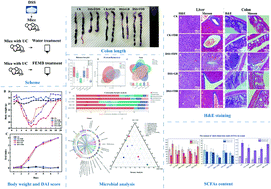Fermented egg-milk beverage alleviates dextran sulfate sodium-induced colitis in mice through the modulation of intestinal flora and short-chain fatty acids†
Abstract
Fermented egg-milk beverage (FEMB) can alleviate the symptoms of intestinal diseases by regulating intestinal flora and supplying nutrition. This study investigated the protective effect of FEMB on dextran sulfate sodium (DSS)-induced ulcerative colitis (UC) in mice. The results showed that FEMB relieved the UC mice's pathological abnormalities and colonic inflammation, and restructured the intestinal flora composition simultaneously. After FEMB treatment for 14 days, the body weight of the mice rose and the disease activity index (DAI) value decreased. Furthermore, the length and form of colons in the UC mice were notably restored. Inflammatory cells decreased or disappeared, and goblet cells and crypt were enriched and modified. 16S rRNA gene sequencing results demonstrated that FEMB treatment could increase the abundance of beneficial bacteria in the cecum content of mice, including unclassified_f_Lachnospiraceae and Lactobacillus. Moreover, probiotics that can increase the content of short-chain fatty acids (SCFAs) may contribute to inflammation alleviation. An increase in amino acids was observed in our experiment, which may benefit nutritional supplements. In conclusion, FEMB treatment can alleviate the damage of DSS-induced colitis in Balb/c mice. This study provides a theoretical basis for both the relief of inflammation and the application of FEMB.



 Please wait while we load your content...
Please wait while we load your content...